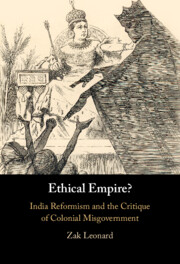Book contents
- Ethical Empire?
- Ethical Empire?
- Copyright page
- Contents
- Figures and Table
- Preface and Acknowledgments
- Association Abbreviations and Key Membership
- Introduction
- 1 The Origins of Reform
- 2 “A Blot on English Justice”
- 3 Public Works, Publicity, and the Search for a New State-Idea
- 4 Reformist Collaboration and the Formation of an Imperial Civil Society
- 5 Anomalous Annexations
- 6 Politicizing Decline
- 7 Radical Reformism and the Challenge of Capitalist Complacency
- Epilogue: Integrating the Empire
- Bibliography
- Index
4 - Reformist Collaboration and the Formation of an Imperial Civil Society
Published online by Cambridge University Press: 05 October 2023
- Ethical Empire?
- Ethical Empire?
- Copyright page
- Contents
- Figures and Table
- Preface and Acknowledgments
- Association Abbreviations and Key Membership
- Introduction
- 1 The Origins of Reform
- 2 “A Blot on English Justice”
- 3 Public Works, Publicity, and the Search for a New State-Idea
- 4 Reformist Collaboration and the Formation of an Imperial Civil Society
- 5 Anomalous Annexations
- 6 Politicizing Decline
- 7 Radical Reformism and the Challenge of Capitalist Complacency
- Epilogue: Integrating the Empire
- Bibliography
- Index
Summary
The colonial state’s institutionalized secrecy had produced an anomaly that reformers were keen to resolve. Britons – even those who prided themselves on their humanitarian dispositions – were seemingly unconcerned about the fates of millions of their fellow subjects on the subcontinent. To address this apathy and provide Indians with a greater role in policymaking, reformers attempted to construct an entirely new social formation that is the focus of Chapter 4: an imperial civil society based on inter-associational linkages. Early reformers in the metropole endorsed the establishment of societies in the Indian presidency towns that could provide reliable information on local conditions. Webs of contact also developed on an individual level, as veteran reformers in Britain advised members of the incipient Bombay Association on constitutionalist techniques. Intent on improving deteriorating race-relations in the 1870s, the East India Association continued to identify strategies to increase Britons’ awareness of Indian issues and facilitate the expression of native public opinion.
- Type
- Chapter
- Information
- Ethical Empire?India Reformism and the Critique of Colonial Misgovernment, pp. 123 - 154Publisher: Cambridge University PressPrint publication year: 2023

